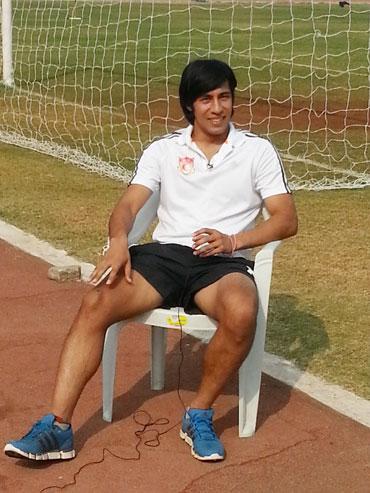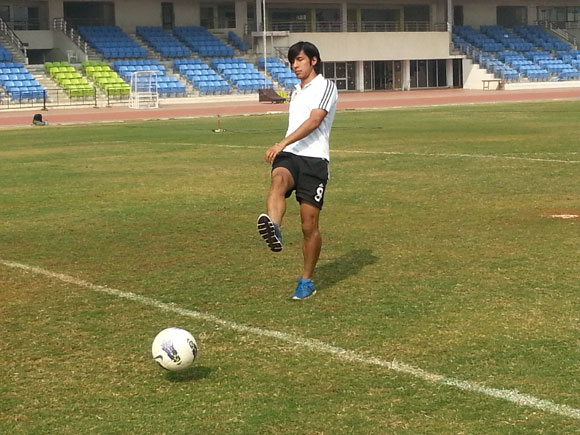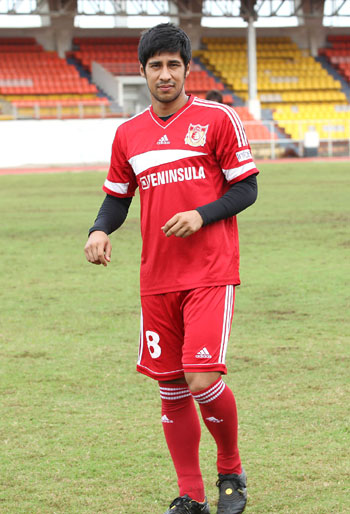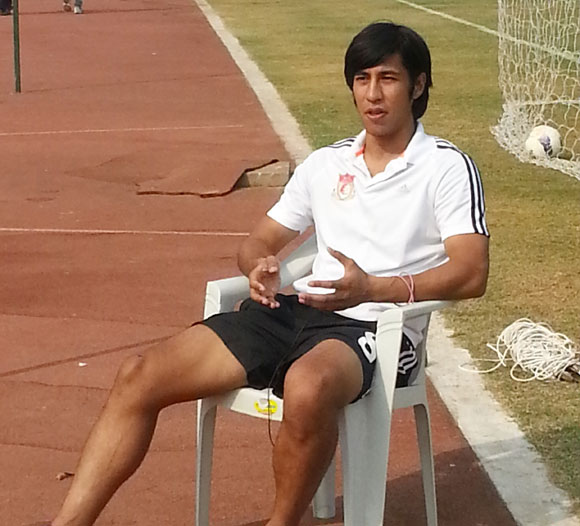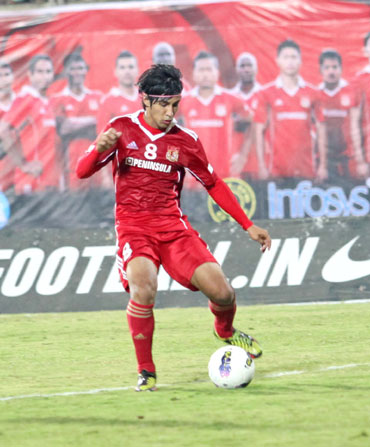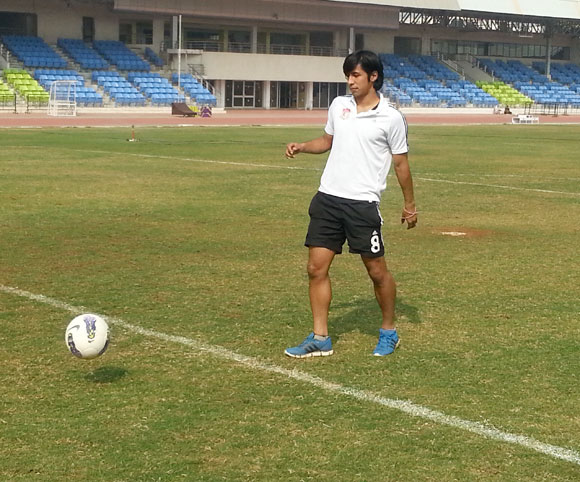 | « Back to article | Print this article |
'Once 11 players play together football becomes an art'
In an exclusive interview with Bikash Mohapatra in Pune, Arata Izumi, the first foreign-born player to get a national call-up, talks about his surprise selection, his career and Indian football in general.
When Wim Koevermans, coach of the Indian football team, announced the 23-member team to play Palestine in a friendly on February 6, there was one name that caught the eye. Arata Izumi.
Born in Japan, to an Indian father, he joined East Bengal in 2006, followed by a spell in the now defunct Mahindra United before coming to Pune FC, the club he has been part of since 2009.
Last year, the player who plays up ront took up Indian citizenship and Koevermans picking him made him the first foreign-orn player to get a national call-up.
Tell us something about your introduction to football.
I started playing football at the age of nine. First, my elder brother started playing and I just followed him. Till that point I didn't know much about football. I knew only baseball and swimming.
The first time I hit the ball, it happened to be a shooting practice. My shot was a good one and went into the goal and people around me applauded. Then I started to practice every day and that is how my football life started.
What is it about the game, in particular, that you like so much?
It's a team sport. And any team sport is beautiful. There are 11 players, each with a different imagination. But once they get used to playing together, they play as one unit. At that moment it becomes an art. I think this is the most important aspect of football.
Photograph: Bikash Mohapatra/Rediff.com
'I realised Indian football has a lot of history'
You started your career in Japan, which has one of Asia's best leagues. You could have got more opportunities and recognition out of that than you would probably get in India, or any other South Asian country for that matter. Did it, at any point, occur to you to further your career there?
Yeah, that's true. But, honestly, it wasn't that smooth for me, the footballing career.
I started playing in Japan, and played some professional side games. But, after that, I shifted to Singapore. And when I was playing in Singapore, I found out another way to enjoy this footballer's life. Being a foreigner, playing professional football in another country, you get much more attention than you would get in Japan, where you are one among many.
And I thought moving out might be a good experience for me. I mean, the footballing career is maybe for 10-12 or maximum 15 years. But what after that? Some might become coaches, some might take to commentary. I thought about it and decided if I have this kind of experience, staying abroad, meeting new people and learning their language that might help me in the long term. So I decided to play abroad.
How did a move to India happen?
When I was playing in Singapore, you know there are a lot of Indians in that country, one of them was into football and he spoke to me regarding playing in India. That was the start.
Initially I didn't know anything about Indian football, and also doubted him. But slowly I started to get information about Indian football.
Then I realised there's a lot of history. Clubs like Mohun Bagan and East Bengal are more than 100 years old. And more than one lakh people watch the Kolkata derby every year. I realised there was a lot of passion for football. These things made me think about shifting to India.
Photograph: Bikash Mohapatra/Rediff.com
'Pune FC is trying to change Indian football'
You have been in India for about seven years and played for three clubs. What changes have you noticed in Indian football during that period?
When I came to India it wasn't even I-League. It was the National Football League (NFL). There wasn't much professionalism back then.
But, in these six-seven years, I can see a lot of improvement. FIFA is also doing a lot to improve the standard of Indian football. Some clubs, I would say, are at par with the Japanese clubs. Of course, the facilities need to improve a lot, but I feel Indian football is developing a lot.
You just said some Indian clubs are on par with the Japanese clubs. But when it comes to big events, like the Asian Championships, our clubs don't figure prominently. What, according to you, is the reason?
It takes a lot of time to catch up with the level of football. What India is doing right now, Japan did 15 years back, to try and get the facility on track and then ensure proper organisation, to make a gradual transition from grassroots to a professional level. It is in this way that you slowly develop the level of the game. In this regard India needs to do a bit of catching up with the likes of Japan, Korea and China.
Pune FC is a fledgling club. How has been the experience so far?
When I came into Pune FC, the first year I played in the PIO quota, and in the second in the Asian quota. But the club's attitude towards me hasn't changed since the first year I came in. They are taking very good care of me, both on and off the field, and I really appreciate that.
I can also see Pune FC is trying to make some changes in Indian football, and it is succeeding to an extent.
'I still can't believe I'll be playing for India'
How did the thought of playing for India come to your mind? Is there any regret of not being able to play for Japan?
Playing for his country is a dream for any footballer. So, obviously, there is some regret. I was born in Japan and started playing football there. Having become a professional footballer I was dreaming to play for Japan, but, in reality, there was no chance for me. Or, maybe, I missed the chance. With my age – right now I am 30 years old – to get into the national team of Japan is almost impossible.
Before I applied for citizenship I thought I had a chance of playing for India. I still can't believe that it has actually happened.
Many other players of Indian origin – Michael Chopra (England) and Vikash Dhorasoo (France) to name two – have been offered the chance to play for India. They didn't take it up. Did you think about that aspect while making your decision?
No. My decision was always based on concern about my people (wife, family and friends). It has nothing to do with why other players of Indian origin refused. Their decision didn't affect me at all. In fact, I didn't even think about them. I only thought if I make this decision will my people be happy, and if India is going to accept me as an Indian.
Photograph: Bikash Mohapatra/Rediff.om
'I am an Indian but my Japanese tastes remain'
How smooth or difficult was the entire process of taking up Indian citizenship?
The process was really tough. First of all, there hadn't been a case of a Japanese taking up Indian citizenship. So no one knew how to start with. Literally, we met more than 10 lawyers to get all the information and it took more than a year. Then I came to know under which section I could apply. That was followed by a lot of documentation. My wife (a physiotherapist) sacrificed her career to get all of this done. I don't know how to appreciate her effort.
Now that you are officially an Indian citizen, how much do you miss Japan?
The attachment is always there. Right now I am an Indian, but my Japanese tastes continue to remain. And my family and friends understand that. I spoke with them many times and sought their opinion. My wife initially dissuaded me but I managed to convince her.
And what about the Indian name (Neelkanth Khambolja)?
I have had that name since I was four years old. In fact, I have had both names. But when I took up Indian citizenship I had no option but to decide on one. I actually wanted to keep both the names. My family and close friends in Japan actually call me Neel. But here in India everyone calls me Arata. So I wanted to keep both names, but there was a rule to choose one. So I decided to stick to Arata.
In India, there is this habit of playing up the Indian origin card the moment a foreign-born individual does well. Was that the case with you as well?
Yeah! I had an Indian father and when I came here as a PIO that helped me a lot. Even after my selection, many people called or messaged to appreciate the achievement and congratulate me. I mean, technically, I am an Indian, but, basically, I am not, so it did feel amazing. If the people had said how could a Japanese play for India I would have fully understood their concern as well.
Photograph: Bikash Mohapatra/Rediff.com
'I am yet to reach the peak'
Coming to your call-up to the Indian national team, how surprising was it?
It was totally surprising. I wasn't expecting anything then. But when I was checking the AIFF website to know I-League standings, I saw this article about the national team and went through the players list, keen to know how many players from Pune FC had made it. It was then that I saw my name and got really excited. Then people started calling me and the feeling sunk in.
How much have you interacted with Wim Koevermans (India coach) so far?
I met him once in Mumbai last year, when I went for this coaching seminar. Then I introduced myself and told him that I am a Japanese taking up Indian citizenship and that I will be playing the next season for Pune FC as an Indian.
You mentioned that you are 30. So, at this stage of your career, how long do you see yourself playing?
For a professional footballer, 30 years means he is at the crossroads of his career. He is basically old. But it is also dependent on the player. Some players rise fast and reach their peak when they are 25 or 26.
But, for me, I feel I am yet to reach the peak, both physically and mentally. I am feeling I can improve even further and can carry on my career for another seven or eight more years.
'India may take more time but will catch up'
What's your observation of the Indian team and the way it plays?
I have watched almost all the matches the Indian team has played in the last seven years. Obviously, the coaches keep changing, so that style of football is different every time. Technically, the team is good, but, physically. not that great.
But I see the players are working really hard. For example, in the Nehru Cup final against Cameroon, I was really impressed with the way they played and the attitude they showed. I, like many others, had thought Cameroon would win. To beat them is a great achievement. I am looking forward to playing with this team.
There's a lot in common between India and Japan. The I-League (or NFL) started in the same time (1995) as the J-League (1993). India, like Japan, also appointed foreign coaches to get better results and Japanese players, like Indians, aren't physically strong enough. But Japan has done quite well for itself while India is still struggling. Why is that so?
India is just too big to organise things fast.
Luckily Japan is very small, compared to India, and thus things have happened faster.
India has taken time, and may take some more time, but will definitely catch up.
